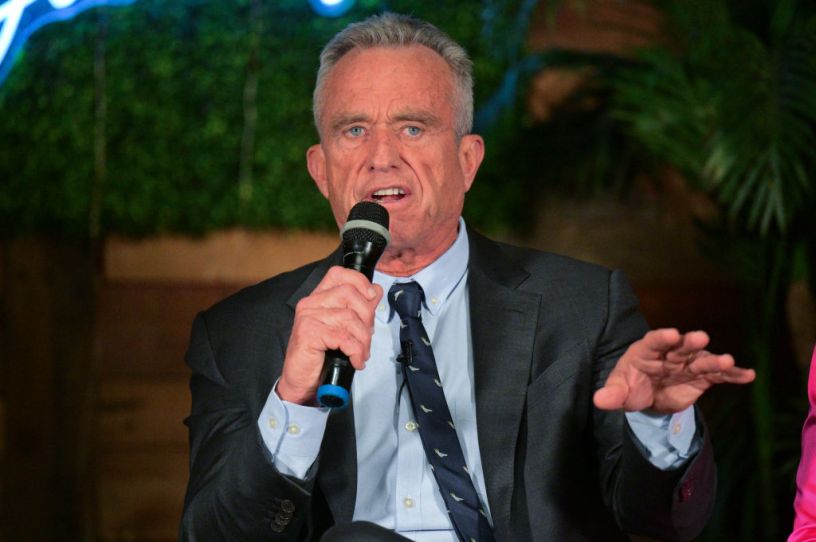Trump’s RFK Jr. Anxieties Are Well Placed

Robert F. Kennedy Jr. wants to close the gaps in the wall at the southern border and sides with Texas in its standoff with the Biden administration over control at Eagle Pass.
He flirted with a federal ban on elective abortions after the first trimester but quickly retreated to saying that the issue ought to be left to the states.
He’s been a staunch supporter of Israel in its war against Hamas but vows to end U.S. support for Ukraine’s war against Russia if elected president, saying America is to blame for the invasion. He lauded the idea of Tucker Carlson sitting down with Russian strongman Vladimir Putin for an interview.
And in the four months since he decamped the Democratic Party to launch his independent presidential bid, the nephew of the 35th president has continued to command substantial support nationally. He gets as many as 1 in 5 voters in a hypothetical matchup with President Joe Biden and former President Donald Trump.
RFK Jr.’s fans love his unpolished style, apostate stances, and most of all, his perceived independence from the political establishment.
“I feel like he’s the only one that hasn’t been bought. I feel like he’s the only one who’s really speaking truth and facts,” as one attendee at a North Carolina campaign event told the Asheville Citizen Times. “And I came to catch the vibe, because I don’t feel I’ll vote any other way. He’s kind of my hope.”
Kennedy is rich, famous, connected to Hollywood, tough on immigration, pro-life (but squishy), backs Israel but not Ukraine, defends Putin (and Carlson), trafficks in conspiracy theories, and says his opponents are all bought and paid for. His supporters—often older, white, working-class Americans—see him as perhaps a last chance to disrupt the broken political order and, driven by vibes and a serious nostalgia trip, make America what it once thought it was. Great again, even.
It’s no wonder that Trump went from being an admirer and reportedly considering Kennedy as his running mate to denouncing him, with typical Trumpian understatement, as “by far the most Radical Left person running for office, maybe ever!”
Kennedy is, of course, also a lot of things that Trump is not. Kennedy is self-effacing, honest (even if you think he’s nuts), and has a great deal of political experience. What he doesn’t have, at least right now, is a way to get on the ballot.
As the centrist group No Labels can attest, even with huge financial resources, a long head start, and lots of experienced political operatives, getting access to states’ presidential ballots is very hard work. Even with all its resources, No Labels looks unlikely to be able to run a 50-state campaign. For a pure independent bid like Kennedy’s, starting less than a year before ballots are printed, it’s pretty well impossible.
Which brings us to the prospect of what once would have been the unlikeliest of political unions: Kennedy, the longtime advocate for environmental regulations, and the Libertarian Party, once a staunch foe of government interference.
Touting his campaign’s “really good relationship” with the Libertarian Party, Kennedy has been holding the door wide open to the prospect of seeking the party’s nomination, which will be awarded by the delegates to the Libertarian Party convention in Washington at the end of May. There are no primaries to win, only party leaders to persuade. And if Kennedy can do that, he would almost certainly be on the ballot in all 50 states and the District of Columbia.
Winning ballot access the first time is hard, but in most states if parties meet typically low thresholds for vote share, they get to keep their place in the next cycle. Libertarian candidates racked up quite a lot of the protest vote in the hold-your-nose-and-vote contests of 2016 and 2020. And the Libertarians, long acclimated to playing the role of spoiler, seem to be quite receptive to the idea of teaming up with the famous, vibe candidate Kennedy. “I’d vote for him in a heartbeat,” said the party’s 2012 and 2016 nominee, former New Mexico Gov. Gary Johnson.
The conventional wisdom on the Democratic side is that the only race that Biden can win against Trump is one in which voters have no alternative but a binary choice between two unappealing candidates. The thinking is that the closer the election becomes, the less appealing Trump will be as an alternative to Biden, and the suburbs will break for the incumbent.
Certainly that seems to be a good argument against No Labels, which seems designed to appeal to the kind of moderate suburbanites who might have preferred to vote Republican but accepted Biden as the lesser of two evils four years ago.
But that’s not the story of a potential Kennedy-Libertarian union.
As evidenced by Kennedy’s continued financial support from former Trump donors and Trump’s growing hostility toward him, Kennedy poses the most direct threat to Trump.
If a voter wants to send a message that she or he thinks the game is rigged, the elites are out of touch, and that the broad establishment is corrupt, Kennedy makes a very appealing protest vote. If you don’t want to reward Biden, but think Trump is unfit, Kennedy’s your man.
Worst for Republicans, a campaign in which Trump feels obliged to compete with Kennedy for the crackpot vote means the likely Republican nominee would have an excuse to chase RFK Jr. down rabbit holes. That, in turn, would drive away the voters most skeptical of returning the former president to power: those same moderate suburbanites Biden is rightly obsessed with winning.